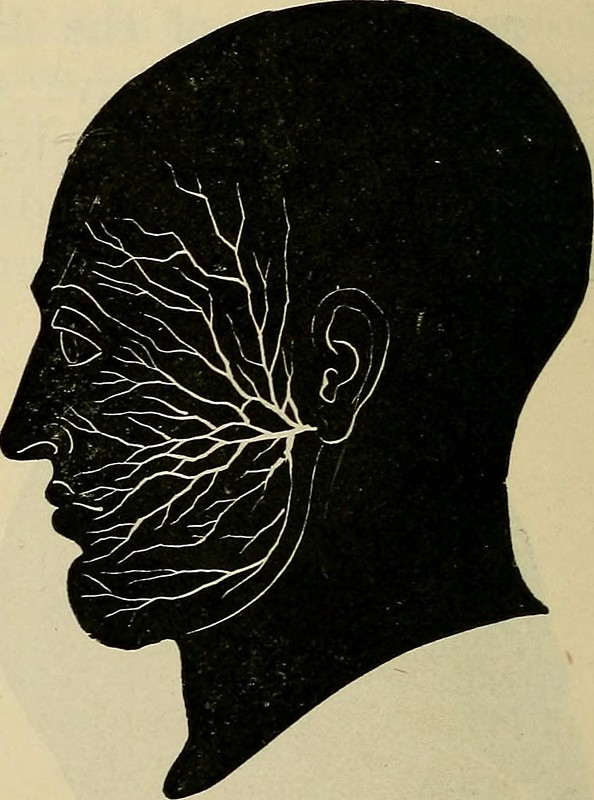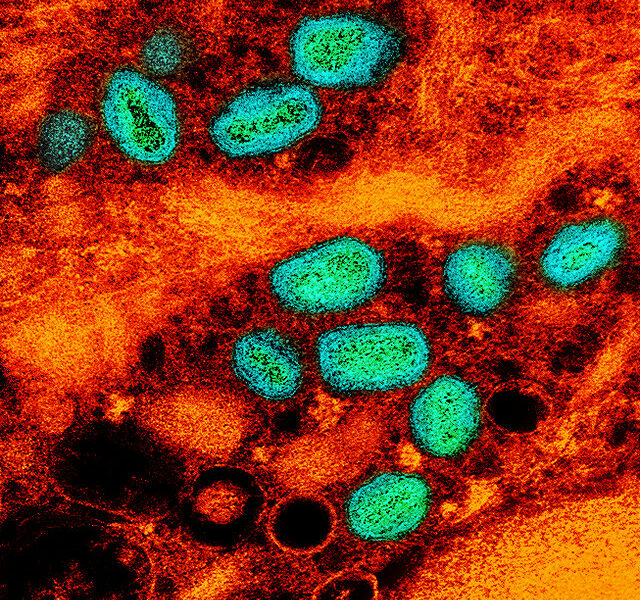By: Amelia Thyen
Image courtesy of Internet Archive Book Images, 1889.
Ramsay Hunt syndrome, named for the neurologist who first described the illness, is a rare viral infection caused by the same virus that causes Chickenpox and Shingles: varicella-zoster virus.1 Once someone recovers from Chickenpox, the virus remains dormant in the body and can re-activate later in life as Shingles or sometimes as Ramsay Hunt syndrome.2 In the case of re-infection with Ramsay Hunt syndrome, the virus is believed to infect a facial nerve near the inner ear which leads to irritation and swelling of the nerve.3 Symptoms may include severe pain in one ear, a painful rash on one side of the face, hearing loss on one side, vertigo, or one-sided facial paralysis.2 Now that pop singer Justin Bieber has developed the syndrome and is experiencing facial paralysis1, the illness is being discussed across mainstream media and has sparked conversations about the varicella-zoster virus that is currently laying dormant in up to 99% of us born before 1980.4
Older Americans may remember attending so-called “pox parties” as children. These “pox parties” occurred when parents let their healthy children play with a child who is infected with Chickenpox in the hopes that they would have a relatively mild illness, recover, and then remain immune for the rest of their lives.5 Prior to the Chickenpox vaccine being introduced in 1996, this practice was relatively common, and still continues among some families today.6 However, we now know how dangerous that practice really is,6 and that the virus remains dormant throughout the lifespan and can cause illnesses later in life.
Scientists do not know exactly what causes varicella-zoster virus reactivation after a Chickenpox infection, but they suspect it is related to physiological stress and thus a decline in immune system function, which allows the virus to thrive.9 Most cases of Shingles and Ramsay Hunt syndrome affect older adults, and are most common in adults over 60 whose immune systems do not function with the same rigor as they once did.7
The CDC estimates that about 1 in 3 Americans will develop Shingles in their lifetime, and the United States (U.S.) reports about one million cases every year.8 Ramsay Hunt syndrome is more rare, affecting approximately 5 per 100,000 people per year in the U.S.8
A vaccine is available and is highly effective at preventing Chickenpox in children, and thus preventing Shingles and Ramsay Hunt syndrome in adulthood. The United States’ vaccination program for Chickenpox began in 1996.9 Prior to the vaccine, more than 4 million people in the U.S. got Chickenpox and 100 people died every year as a result of it.9 After 15 years of the vaccination program, the U.S. sees 92% fewer cases per year and fewer than 20 people die every year from Chickenpox.9
In addition to being vaccinated for Chickenpox as a child, a Shingles vaccine is available and highly effective at preventing Shingles in adults, regardless of whether they had Chickenpox as a child. The current Shingles vaccine, Shingrix, is recommended in two doses for adults over 50, as well as adults over 19 who have a weakened immune system due to disease or therapy.10
Other than the vaccines used to prevent Chickenpox and Shingles, there is no other known way to prevent Ramsay Hunt syndrome, but treating it soon after symptoms develop can improve recovery.3 Multiple studies have shown that treatments with oral antiviral medication and steroids significantly reduce long term complications as a result of the illness.11
While Ramsay Hunt syndrome may present with serious symptoms, like in the case of Justin Bieber’s half-paralyzed face, it is rare and often treatable. Therefore, healthcare professionals advise that it should not be a cause for major concern.1 Often, symptoms will subside within a few weeks, but it is recommended to start treatments within the first 3 days of experiencing symptoms for the best results.3
Consult your doctor if you have further questions or if you are concerned about Chickenpox, Shingles or Ramsay Hunt syndrome, as well as to schedule an appointment to get vaccinated.
References:
- https://www.nytimes.com/2022/06/10/well/live/ramsay-hunt-syndrome-facial-paralysis.html
- https://www.mayoclinic.org/diseases-conditions/ramsay-hunt-syndrome/symptoms-causes/syc-20351783
- https://www.mountsinai.org/health-library/diseases-conditions/ramsay-hunt-syndrome
- https://www.cdc.gov/shingles/about/index.html
- https://www.cdc.gov/chickenpox/about/transmission.html
- https://www.forbes.com/sites/brucelee/2019/03/23/why-chickenpox-parties-are-a-bad-idea/?sh=48fac4d46b71
- https://rarediseases.org/rare-diseases/ramsay-hunt-syndrome/
- https://www.cdc.gov/shingles/index.html#:~:text=About%201%20out%20of%20every,chickenpox%2C%20you%20can%20get%20shingles.
- https://www.ncbi.nlm.nih.gov/books/NBK557409/#:~:text=Ramsay%20Hunt%20syndrome%20affects%20both,roughly%207%25%20of%20acute%20facial
- https://www.cdc.gov/chickenpox/vaccine-infographic.html
- https://www.cdc.gov/vaccines/vpd/shingles/public/shingrix/index.html
- https://www.ncbi.nlm.nih.gov/books/NBK557409/


